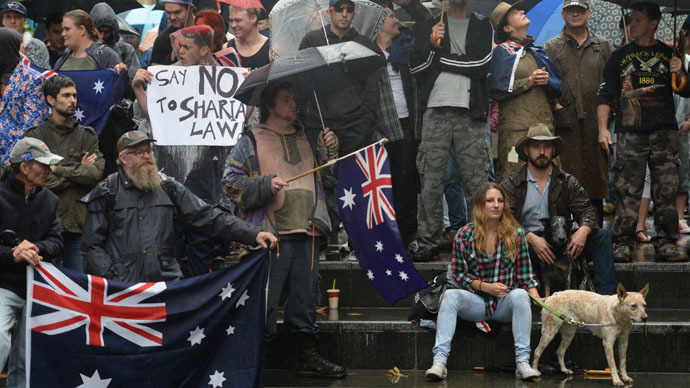Muslim community leaders expressed fear and bewilderment after protesters gathered in over a dozen Australian cities at the weekend to express their opposition to minority groups, who want to ‘change the cultural identity of the country.’
Randa Kattan, CEO of Arab Council Australia, warned such racist
type of events could quickly spiral out of control.
“In terms of numbers they might be insignificant, but in
terms of damage, it is significant,” she told the Guardian.
She called the protesters “squeaky wheels grabbing
attention,” but was careful not to underestimate such groups
for attracting interest to their cause.
“It only takes one incident,” she warned.
Reclaim Australia protests demand banning of Islam and the Burqa #ReclaimAustralia Britain stands with Australia pic.twitter.com/MrJOeRVmXi
— David Jones (@DavidJo52951945) April 4, 2015
The ‘Reclaim Australia’ protests on Saturday were held in 16
cities and towns nationwide, attracting hundreds of
demonstrators, who said they are against the imposition of Sharia
law, and the wave of multiculturalism that has swept the country.
However, the anti-Islam protesters met stiff opposition from the
left-wing umbrella group ‘No Room for Racism.’ Tensions peaked in
central Melbourne, where police struggled to keep anti-Islam and
anti-racism protesters separated. Medical officials said four
people were treated for minor injuries, while police spokeswoman
Belinda Betty said two men and a woman were arrested following
the violence.
More than 100 police were deployed, with almost a dozen mounted
police also helping to keep the situation under control.

One of the organizers of the anti-racist demonstration, Mel
Gregson, credited her organization with preventing a number of
speakers from the anti-Muslim group from making it to the
rallying point. Gregson, who said she believes in the freedom of
speech, told RT this represented “a huge victory.”
“People have the right to freedom of speech, but people need to
be accountable to what they say and if people are spreading hate
speech and lies, particularly about religious or ethnic
minorities, then they need to be held accountable for that,”
she said.
“The streets of Melbourne are not the place for anti-Muslim
ideas.”
Greg Fealy, at the School of International, Political &
Strategic Studies at Australian National University, believes the
anti-Muslim faction subscribes to an “Anglo-centric”
worldview.
“Although they claim it’s to protect an Australian way of
life, their vision of that way of life is a very Anglo-centric
one, and one that often quite specifically rejects the role of
Muslims in Australia,” he told RT.
Far too many children exposed to the ugliness of today. #ReclaimAustralia teaching kids fear, prejudice and hatred. pic.twitter.com/dMz4GDuIek
— Brad Chilcott (@bradchilcott) April 4, 2015
Fealy then mentioned some comments by Prime Minister Tony Abbott
that came at a bad time.
He said the protests came at “an unfortunate time,”
particularly when Tony Abbott delivered a “couple of
unfortunate remarks” about the Muslim community, which he
said was “not doing enough to combat radicalism.”
Thus, comments from the government, together with the anti-Muslim
protests, have created a “good deal of disgruntlement…among
the senior leadership of the Islamic community,” and the
anti-Muslim protests will likely reinforce the idea that it’s
“not a particularly congenial time for Muslims in
Australia.”
Other activist also suggest the government of Prime Minister Tony
Abbott is largely responsible for stirring up anti-Islamic
tensions and making new arrivals to Australia feel unwelcomed.
Kon Karapanagiotidis from the Asylum Seeker Resource Centre
blamed the government’s tough border protection policies for the
rise in attacks on minority groups.
“This is a community that feels like it is under attack, a
community that feels isolated and unwelcome,” he told the
Guardian. “Reclaim Australia makes asylum seekers feel more
under threat.”
Tensions between Australians and Muslims have been mounting of
late. In September, Australian police launched a series of
anti-terrorism raids, while a siege by an Iranian-born Muslim man
in Sydney last December left three people dead and four injured.
A survey conducted by the University of Queensland at the start of 2015 reported that up to 75 percent of Muslims living in Australia say anti-terrorism laws target them unfairly.

